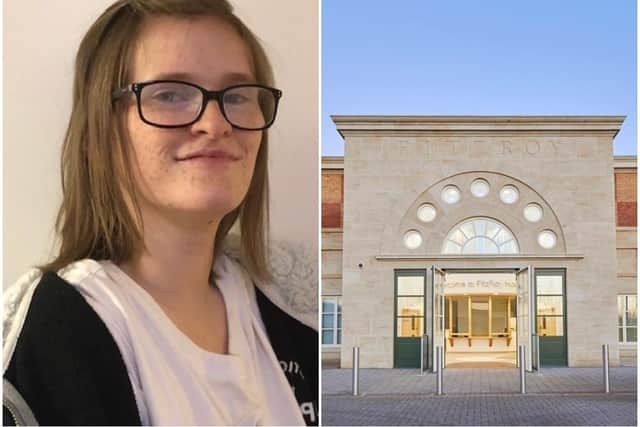#SammysCampaign: Northampton mental health hospital patients won't rest until they bring gender equality to deaf services
and live on Freeview channel 276
Two patients at a Northampton mental health hospital say they will not rest until deaf women have the same level of mental health services as men.
Deaf men with complex mental health conditions have a range of specialist, secure inpatient services at different security levels available while women do not.
Advertisement
Hide AdAdvertisement
Hide AdSammy and Cassie are both profoundly deaf and also suffer from complex mental health conditions, which require specialist care at St Andrew’s Healthcare's base on Billing Road.


The pair want the government to fund a specialist mental health unit for deaf women to address the inequality that they have struggled with for most of their lives.
Sammy, 26, said: "I am asking the government and NHS England to fund a ward for deaf women. We need equality, we need things to be 50/50 for deaf men and women."
Specialist, secure deaf services speed up a patient's recovery by providing care in their own language, allowing them to understand their diagnosis while feeling part of a community.
Advertisement
Hide AdAdvertisement
Hide AdFairbairn Ward at St Andrew’s is one such ward - half of the nurses are deaf plus all staff and patients are trained in British Sign Language, ensuring greater engagement and participation in therapy.
But for Sammy, whose surname has been left out to protect her identity, her recovery is hindered as she cannot be on that ward because of her gender.
The patient, who has been at St Andrew’s for 18 months, has interpreters with her all day and a consultant psychiatrist who specialises in deaf mental health but she says this does not go far enough.
"Before I arrived at St Andrew’s, I was in psychiatric wards where staff struggled to communicate with me. This just made me feel even more stressed and frightened," she said.
Advertisement
Hide AdAdvertisement
Hide Ad"It was so hard for me to develop any sort of relationship with hearing people on the ward, because I just couldn’t communicate with them.
"They couldn’t understand British Sign Language and I couldn’t hear what they were saying. It made me feel like I wanted to end my life.”
Cassie, whose name has been changed to protect her identity, has been in mental health services for more than 20 years and has faced the same issues as Sammy.
"I’d be discharged much quicker [if there was a women’s deaf service] because the focus would be entirely on my mental health, rather than struggling with communication all the time," she said.
Advertisement
Hide AdAdvertisement
Hide Ad"I just want to be in my own flat with proper support. Men have the support, but women don’t. It’s not fair. We need equality.”
According to leading deaf health charity, SignHealth, up to half of the deaf community in the UK suffer from mental health problems, such as depression, anxiety and low-self-esteem.
Part of this is down to the lack of mental health support available to deaf people and the communication barriers they face in accessing services, which leads to poorer mental and physical health than the rest of the population.
In addition research shows that deaf inpatients are likely to remain in psychiatric hospitals twice as long as their hearing peers.
Advertisement
Hide AdAdvertisement
Hide AdThe studies show this is not solely down to their mental health conditions but rather a lack of community provision can negatively impact a deaf person’s length of stay.
Consultant psychiatrist for deaf people at St Andrew’s, Alexander Hamilton, said: "The difficulties deaf people face when seeking mental health help are often woefully misunderstood and it can often be very difficult to even get a deaf person to have consistent access to a British Sign Language interpreter, let alone the expertise of specialist clinicians skilled in working with deaf people with mental health problems.
"Under the Equality Act, deaf people are included as having ‘protected characteristics’ and everyone who uses mental health services should have equitable access but for women like Sammy and Cassie this is clearly not the case.
"We have to get this changed. It cannot be fair that deaf women do not get the same level of mental health care as other people.
Advertisement
Hide AdAdvertisement
Hide Ad"There are other Sammys and Cassies across the country struggling to get the help they need and deserve. We all have a duty to help them.”
Sammy and Cassie have launched a campaign to convince the government and NHS England, using #SammysCampaign on social media and starting a petition, which has had more than 120 signatures so far.
The Department for Education has been contacted for comment.
Comment Guidelines
National World encourages reader discussion on our stories. User feedback, insights and back-and-forth exchanges add a rich layer of context to reporting. Please review our Community Guidelines before commenting.